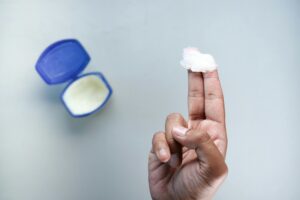Table of Contents
Stress and acne are twin problems that have crossed the boundaries of millions of people across the globe. While most talk about the psychological effects of stress, its physical consequences, such as acne, are equally paralyzing. Can stress really cause acne? Let’s delve into this extremely complicated interaction between stress and hormones in the perspective of dermatology.
The Science of Stress and Acne
1. Cortisol and Stress Response
Stress activates the HPA axis (hypothalamic-pituitary-adrenal axis is your body’s main way of responding to stress), which in turn causes the adrenal gland to release the hormone cortisol(a vital hormone that impacts nearly all of your body’s tissues and organs), which initiates off physiological processes. This hormone, cortisol, plays a role in the body’s “fight or flight” response, preparing us to react to immediate danger. A high cortisol level leads to physiological reactions as follows: enhanced heart rate and blood pressure, the availability of increased glucose for energy, the inhibition of immunity, and hormonal production changes.
2. Hormonal Imbalance
Cortisol upsets the body’s main sensitive hormone balance, which involves:
- Insulin: Cortisol increases the level of insulin resistance, which leads to a fluctuating blood sugar level and inflammation.
- Growth hormone: Cortisol inhibits production of growth hormones, which distracts regeneration of the skin and produces collagen.
- Androgens (Testosterone, Dihydrotestosterone): Increased hormones lead to increased production of androgens which causes an increase in sebum production and pores become large, developing acne.
This hormonal change creates an ideal state for the development of acne.
3. Inflammation
The body reacts to stress in a variety of ways which promote inflammation within its systems.
- Cortisol can cause the development of pro-inflammatory cytokines(contribute to or aggravate inflammation).
- Stress acts on the immune cells that ultimately result in inflammation.
Increased inflammation leads to the following :
- Redness and irritation of skin
- Scarring of acne
- Post-inflammatory hyperpigmentation
Chronic inflammation creates a cycle of acne that is difficult to break-the clear skin.
4. Gut-Skin Connection
Stress modifies the bacteria in the gut, weakening the strength of the skin’s natural barrier and causing inflammation. The axis of gut-skin comprises:
- Altered gut microbiome
- Increased gut permeability; leaky gut
- Release of pro-inflammatory cytokines
- Dysregulation of skin barrier function
- Susceptibility to acne-producing bacteria (P. acnes)
The Gut-Skin Link. All these demonstrate the necessity of a well-balanced gut micro-environment for normal skin function.

How Does Stress Cause Acne?
1. Increase oil production
Cortisol stimulates the oil glands, resulting in:
- Excessive oily look
- Open pores
- Clogged pores
- Development of acne (blackheads, whiteheads, papules, and pustules)
This extra oiliness acts as an ideal bed for acne-causing bacteria (P. acnes).
2. Inflammation and Redness
Induced inflammation by stress results in:
- Redness, inflammation
- Swelling
- Post-inflammatory hyperpigmentation
- Acne lesions (papules, pustules, nodules)
- Infection and tendency to get acne scars
Since inflammation favors the mechanism of acne causation, it tends to become challenging to get clear skin.
3. Delayed Wound Healing
Stress negatively affects the healing process of the wound through:
- Collagen production is reduced
- Tissue repair is inhibited
- Inflammation is increased
- Acne lesions persist
- Healing is prolonged
Consequently, prolonged healing time makes the acne lesions chronic, and the skin problems are here to stay.
4. Damage to the Natural Barrier of the Skin
Stress removes a person’s natural barrier from his or her skin, which exposes it to:
- Bacteria (P. acnes)
- Pollution
- Irritants of no consequences
- Allergens
- Environmental stress
A burst skin barrier enables harmful substances, which causes inflammation and ultimately leads to the outbreak of acne .
Acne-Stress Cycle:
1. Stress Triggered Acne
Stress triggers the following:
- Hormonal imbalances (cortisol, insulin, androgens)
- Inflammation (increased cytokines, prostaglandins)
- Increased sebum production
- Damage to the skin barrier
- Dysregulation of the gut-skin axis
These physiological responses create a nidus for acne development.
2. Acne is also stress-promoting
Acne can precipitate:
- Emotional distress (anxiety, depression)
- Low self-esteem
- Social withdrawal
- Body image issues
- Anxiety about appearance
This emotional consequence is terrible in itself but also tends to heighten baseline stress.
3. Vicious cycle
Stress-acne fuels each other in the most direct, vicious way.
Stress → Acne → Emotional Distress → Increased Stress → Worsening Acne
Hormonal imbalances → Inflammation → Skin barrier disruption → Increased stress
To break this cycle one would have to address issues concerning stress management as well as to treat the acne.
Consequences of the Stress-Acne Cycle
- Chronic acne
- Acne scarring
- Emotional distress
- Mental health issues (anxiety, depression)
- Poor quality of life
- Social isolation
Breaking the Cycle
To break the stress-acne cycle:
- Manage stress through yoga, meditation, and deep breathing.
- Follow a detailed skincare routine (gentle cleansing, hydration, protect your skin from the sun)
- Seek out someone who can guide you (dermatologists, therapists)
- Regulate your hormones (see your doctor)
- Build body self-esteem
Key Facts
- Nearly 50 percent of people with acne said they had a flare-up due to stress, according to the American Academy of Dermatology
- 75 percent of adults who had acne felt it made them feel stressed, according to research in the British Journal of Dermatology
- Researchers determined in the Journal of Clinical and Aesthetic Dermatology that acne increases stress by 34 percent
Stress Relieving Techniques
Practice every day:
- Yoga: Decreases cortisol levels, mood improved
- Meditation: Reduction in stress, relaxes
- Deep Breathing: Reduces blood pressure, calms the mind
- Exercise: Releases endorphin, mood improved
- Mindfulness: Enhancement of awareness, anxiety reduced
- Journaling: Express the self and clears thoughts
- Progressive Muscle Relaxation: Relaxation of muscles, reduces tension
Skincare Routine
Design an everyday gentle routine.
- Cleansing: Use non-comedogenic
- Moisturizing: Oily and non-comedogenic products for hydrating skin
- Sun protection: Use a broad-spectrum SPF 30+ sunscreen.
- Exfoliate Gently 1-2 times a week
- Spot treatment: Apply products specific to acne on areas that have broken out
Dietary Modulation
Have as much as:
- Balanced nutrition: Whole foods, fruits, veggies, whole grains
- Omega-3 rich foods: Fatty fish, flaxseeds, walnuts
- Probiotics: Yogurt, kefir, fermented foods
- Hydrate: Drink lots of water
- Avoid: Processed food and sugar
Professional Help
Consult:
- Dermatologists: Skincare consulting for individual skin
- Therapists: Stress management and emotional support
- Nutritionists: Dietary plans for individual needs
- Wellness coaches: Wholesome lifestyle consulting
Conclusion
So, there is a delicate dance of stress and acne, which has an impact not only on the physical aspect but also the mental. Due to the complex science involved, by understanding the science, you can better take control over your skin health and build up your strength in order to face the challenges of your life. When you recognize the interconnected process between stress hormones and inflammation to disrupt the skin barrier, you will unlock yourself to beautiful healthy-looking skin.
Such a stress-acne cycle can only be broken with multi-strategy action combining stress management techniques, holistic skincare routines, healthy lifestyle choices, and professional guidance. Natural stress-reducing activities, such as yoga, meditation, deep breathing, and mindfulness, can prevent the negative effects of stress, while gentle, nourishing skincare routines and balanced nutrition improve the severity and frequency of acne.
With this holistic approach, you will be able to avoid the worst effects of stress on skin health, reduce the severity and frequency of acne, promote general well-being, enhance your self-confidence and resilience, and enjoy healthy-looking radiant skin. Patience and persistence remain important in helping you have what might appear minor improvements.
Take great care of yourself and be kind to your own mind and heart, to begin this journey of transformation. Great assets are education and awareness, but be reminded that support for professionals and loved ones cannot be overemphasized. When you ask, you will unleash your potential in radiant-looking skin, better mental health and wellbeing, improved self-esteem and confidence, and a more balanced life.
You shall gain control over your stress, skincare, and wellness in general to unlock a brighter, more resilient you. Staying up-to-date, having the radiant health look of skin is well within your reach.
Can stress cause acne in anyone?
Yes, stress can bring acne on any person regardless of age or skin type.
How long will my stress-related acne last?
The time frame varies; managing stress usually aids in dissolving symptoms.
Does stress cause other skin problems to arise?
Stress makes eczema, psoriasis, and rosacea worse.




